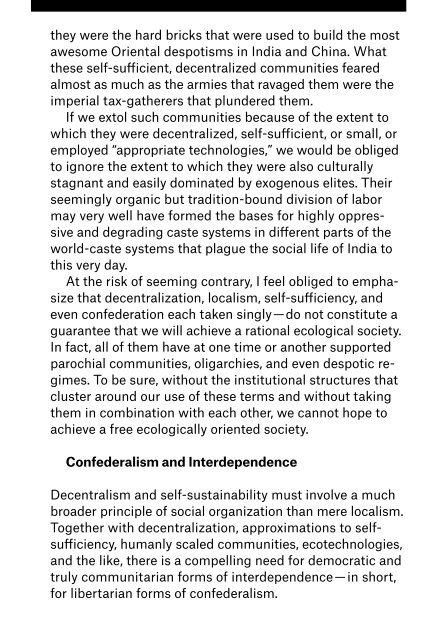Stateless Democracy
1RHiH4Y
1RHiH4Y
You also want an ePaper? Increase the reach of your titles
YUMPU automatically turns print PDFs into web optimized ePapers that Google loves.
they were the hard bricks that were used to build the most<br />
awesome Oriental despotisms in India and China. What<br />
these self-sufficient, decentralized communities feared<br />
almost as much as the armies that ravaged them were the<br />
imperial tax-gatherers that plundered them.<br />
If we extol such communities because of the extent to<br />
which they were decentralized, self-sufficient, or small, or<br />
employed “appropriate technologies,” we would be obliged<br />
to ignore the extent to which they were also culturally<br />
stagnant and easily dominated by exogenous elites. Their<br />
seemingly organic but tradition-bound division of labor<br />
may very well have formed the bases for highly oppressive<br />
and degrading caste systems in different parts of the<br />
world-caste systems that plague the social life of India to<br />
this very day.<br />
At the risk of seeming contrary, I feel obliged to emphasize<br />
that decentralization, localism, self-sufficiency, and<br />
even confederation each taken singly — do not constitute a<br />
guarantee that we will achieve a rational ecological society.<br />
In fact, all of them have at one time or another supported<br />
parochial communities, oligarchies, and even despotic regimes.<br />
To be sure, without the institutional structures that<br />
cluster around our use of these terms and without taking<br />
them in combination with each other, we cannot hope to<br />
achieve a free ecologically oriented society.<br />
Confederalism and Interdependence<br />
Decentralism and self-sustainability must involve a much<br />
broader principle of social organization than mere localism.<br />
Together with decentralization, approximations to selfsufficiency,<br />
humanly scaled communities, ecotechnologies,<br />
and the like, there is a compelling need for democratic and<br />
truly communitarian forms of interdependence — in short,<br />
for libertarian forms of confederalism.<br />
I have detailed at length in many articles and books (particularly<br />
The Rise of Urbanization and the Decline of Citizenship)<br />
the history of confederal structures from ancient and<br />
medieval to modern confederations such as the Comuneros<br />
in Spain during the early sixteenth century through the<br />
Parisian sectional movement of 1793 and more recent attempts<br />
at confederation, particularly by the Anarchists in<br />
the Spanish Revolution of the 1930s. Today, what often<br />
leads to serious misunderstandings among decentralists is<br />
their failure in all too many cases to see the need for confederation<br />
— which at least tends to counteract the tendency of<br />
decentralized communities to drift toward exclusivity and<br />
parochialism. If we lack a clear understanding of what confederalism<br />
means — indeed, the fact that it forms a key principle<br />
and gives fuller meaning to decentralism — the agenda<br />
of a libertarian municipalism can easily become vacuous at<br />
best or be used for highly parochial ends at worst.<br />
What, then, is confederalism? It is above all a network of<br />
administrative councils whose members or delegates are<br />
elected from popular face-to-face democratic assemblies,<br />
in the various villages, towns, and even neighborhoods of<br />
large cities. The members of these confederal councils<br />
are strictly mandated, recallable, and responsible to the<br />
assemblies that choose them for the purpose of coordinating<br />
and administering the policies formulated by the<br />
assemblies themselves. Their function is thus a purely<br />
administrative and practical one, not a policy making one<br />
like the function of representatives in republican systems<br />
of government.<br />
A confederalist view involves a clear distinction between<br />
policymaking and the coordination and execution of<br />
adopted policies. Policymaking is exclusively the right of<br />
popular community assemblies based on the practices of<br />
participatory democracy. Administration and coordination<br />
are the responsibility of confederal councils, which become<br />
120–121



